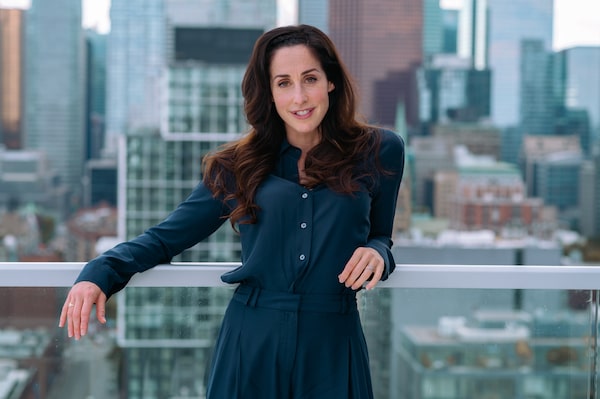
Workin’ Moms creator, star and director Catherine Reitman.Jackie Brown/CBC
In 2017, when the CBC series Workin’ Moms was brand new, I moderated a panel discussion at Toronto’s TIFF Bell Lightbox led by the show’s creator/star/director Catherine Reitman. It was an important night for her. She’d gotten a series on the air. (It’s now on Netflix, too.) Her parents were there. It was a full house, in a building that her family had funded. She was claiming her place as a writer/director, alongside her brother, Jason, and her father, Ivan. (She’s still reeling from Ivan’s death last February.)
“When someone finally gives you the chance to do something you’ve always wanted to do,” Catherine said in a recent video interview, her voice thickening with tears, “you wait for the bottom to drop out.”
That’s how hard Reitman is on herself. But in fact, the bottom kind of did. Everyone on stage was seated in tall, canvas-and-wood director’s chairs. Mid-event, the canvas seat of Reitman’s chair broke. Me, I would have plummeted through the chair legs and landed with my backside to the audience. But Reitman caught herself, gripping the chair arms with her elbows straight, like a gymnast on parallel bars. Now, as Workin’ Moms enters its seventh and final season, “I can appreciate the humour of that moment,” she says wryly.
I appreciate her strength. Across 83 episodes, Reitman, 41, her writers and cast – Reitman as Kate, a PR exec determined not to let motherhood change her; Dani Kind as Anne, a psychiatrist who doesn’t deny her anger; Jessalyn Wanlim as Jenny, an IT specialist who dares to put herself first; Enuka Okuma as Sloane, a capital-B Boss; and Sarah McVie as Val, a searcher who led the Mommy and Me group that brought these women together – have mined their personal lives to tell uncomfortable truths about working motherhood circa today. They’ve tackled miscarriage, post-partum depression, adultery, sexual assault, blended families, adolescent rebellion and abortion. (They were surprised there was no blowback from the latter – in fact, viewers were more upset when a grandmother character said she’d only babysit if the family got rid of their dog.)
They dug into an unholy trinity that sitcoms rarely address: women’s anger, ambition and selfishness. They acknowledged that working mothers are never just one thing – they’re happy yet irked, successful yet guilty, hyper-competent yet panicked. And they made it funny.
TMI (too much information) is a concept Reitman seems not to believe in. The characters began as different aspects of her “flaws as a mother,” she freely admits. “Also, I didn’t have close friends back then, and I wrote it thinking, ‘What I’d give for a best friend I could yell at and be okay with afterward, to laugh and talk smack about how painful things are.’” She pauses. “I think we [overtaxed working mothers] are all so goddamn lonely. And even when our wildest dreams come true, we don’t always feel the pleasure we thought we would. We just see the next goalpost.”

Fans tell Reitman they 'feel seen.'Jackie Brown/CBC
In a separate video interview with the actors mentioned above, I posited that we say “TMI” when we’re edging close to something dangerous. “Oooh,” replied Okuma, who’s also a writer on the series, “for Catherine, as soon as it feels like it’s TMI, it means you’ve hit the button. TMI was our goal.”
Goal achieved. Fans tell Reitman they “feel seen.” They thank Kind for portraying anger as just part of who women are. They cry with Wanlim, whose character had a miscarriage, and who is vocal about the miscarriages she’s had in real life – in fact, she experienced one just as they were filming the episode about it. They channel Okuma’s character, Sloane, before going into work meetings. One even named her child Sloane.
This final season continues the debate about how best to survive working motherhood – Multitasking vs. narrow focus? Delegating vs. controlling? – and digs into zeitgeisty questions: Why do women buy into toxic masculinity? Why are we hardest on each other? “I think people feel exhilarated watching these flawed women, who make bad decisions and pay the price for them,” Reitman says.
That price depended on the belief system in the writers’ room. Did they believe someone should be punished for having an abortion? Absolutely not. Did the sexual harasser face consequences? Initially, no. “At first we treated it like just another thing a woman has to deal with, on par with your car battery dying,” Reitman says. “Later we reshot a better ending where he was brought to justice.” The most fruitful stories boiled down to a single question: What does a working mother who’s doing the best she can look like?
“When we started, people often asked, ‘Do people aside from mums relate to the show?’” McVie recalls. “That’s weird. Do we ask that about Law and Order? ‘Do people enjoy the show, even if they’re not lawyers?’ But that tells you where we were coming from.”
The characters had their arcs – Sloane, for example, gradually shed the emotional armour she thought she needed to survive in a man’s world, softening as she began to rely on other women – and the actors did, too. “Watching how Catherine ran the show, how she created, starred, produced and directed it, and somehow sustained her marriage and family, taught me so much about how to conduct yourself as a businesswoman,” Kind says. “How to delegate, how to ask for help, how to channel your energy, how to follow through.”
“Nobody says to Clint Eastwood, ‘Should you juggle all this?’” Okuma chimes in.
“Yes!” Kind replies. “Nobody would ask, ‘But what about your children?’ There’s this idea that women should be dedicating our time to taking care of others, but what if, instead, we said, ‘Or.’ Or we could do all the things that are living inside us that we have to get out, and do that for our children.”

Reitman thrives on controlling her own destiny.Jackie Brown/CBC
Wanlim is writing a series pilot, her first. Kind is directing her first project. Okuma is co-starring with Giancarlo Esposito in a new AMC series, and optioning books to adapt. “My self-confidence has risen,” she says. “I will fight harder to be heard.” And McVie’s takeaway is that good storytelling can change social norms.
“When I was 20, I was told I’d never work in TV because I didn’t have the body for it,” she says. “And there I was in Season 3, in my underwear, pretending to trip on acid. We can write the future.”
As for Reitman, seven seasons ago she was a fledgling showrunner with a three-month-old baby, working around the clock, scared to do it all and scared not to try. Now she thrives on “controlling my own destiny.” She has several projects in the works, none she can announce yet. But she always knew where she wanted her workin’ moms to end up: in the middle of it all.
“It’s not a story about a drug dealer who finally gets busted, or a detective who finds the bad guy,” she says. “Working mothers just keep getting up and going to work.”
Sign up for The Globe’s arts and lifestyle newsletters for more news, columns and advice in your inbox.